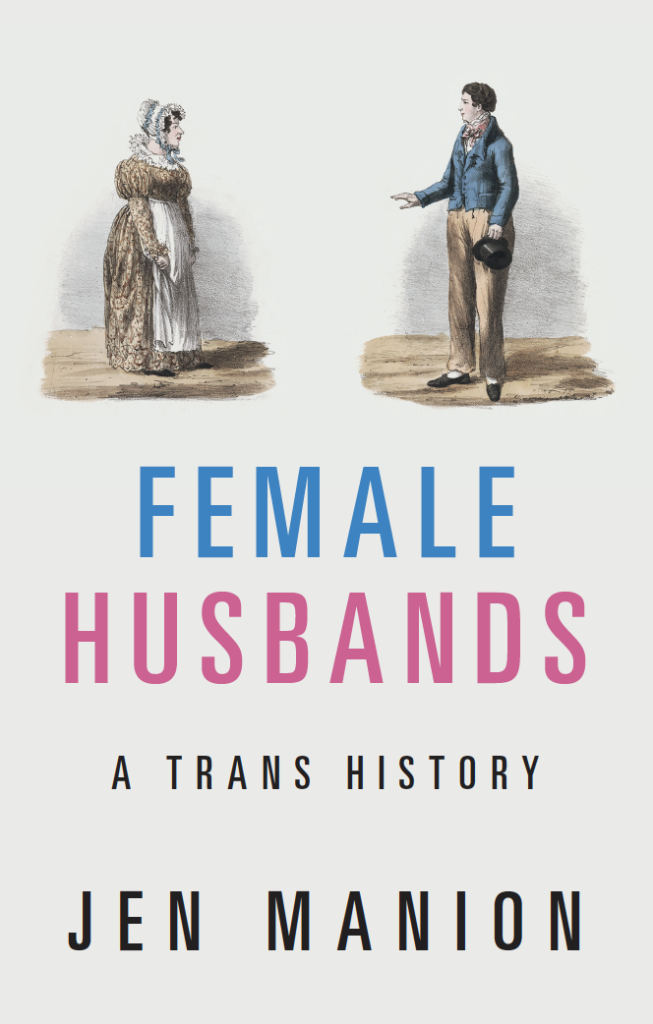Jen Manion
Long before people identified as transgender or lesbian, there were female husbands and the women who loved them. Female husbands – people assigned female who transed gender, lived as men, and married women – were true queer pioneers. Moving deftly from the colonial era to just before the First World War, Jen Manion uncovers the riveting and very personal stories of ordinary people who lived as men despite tremendous risk, danger, violence, and threat of punishment. Female Husbands weaves the story of their lives in relation to broader social, economic, and political developments in the United States and the United Kingdom while also exploring how attitudes towards female husbands shifted in relation to transformations in gender politics and women’s rights, ultimately leading to the demise of the category of ‘female husband’ in the early twentieth century.

NOTCHES: In a few sentences, what is your book about?
Jen Manion: Female Husbands is about white working-class queer couples from the 18th and 19th centuries. The husbands were people assigned female at birth who transed gender, lived as men, and married a woman. Their stories are so important but most people didn’t even realize that queer/trans couples existed hundreds of years ago. Sadly, the only reason I was able to write the book was because of the newspaper articles that circulated when the husband was “outed” and the couple was usually subject to scrutiny, hostility, and sometimes violence.
NOTCHES: What drew you to this topic, and what questions do you still have?
JM: I have always wanted to learn more about queer/trans lives before the turn of the twentieth century when gender nonconformity became conflated with homosexuality, especially for women. I still have so many questions about the experiences of Black, Latinx, Asian, and Native Americans who transed genders in this era because the records that I was able to find focused predominantly on white people.
NOTCHES: This book engages with the history of sexuality, but what other themes does it speak to?
JM: In addition to sex and sexuality, the book examines labor and working-class experiences and gender norms, the circulation of people and ideas via the press and/or boats, and the carceral state, which was rapidly transforming during this era.
NOTCHES: How did you research the book?
JM: The book is anchored in newspapers from digital archives, but that emerged after I spent a few years reading essays, pamphlets, dime novels, court and prison records, and organizational papers. And once I decided to focus on the newspaper sources, I combed through them and went back into more traditional archives – birth, death, marriage, taxes, census, court records, etc. – to verify as much as I could. I think my favorite discovery occurred in the public library in Syracuse in the microfilm room where I accessed the last surviving copy of a newspaper that allowed me to confirm that two different female husband cases involved the same person! It was literally in the middle of a blizzard, the day after Christmas. Everyone was so upset that I insisted on spending the day after Christmas in the archives, but it ended up being a magical day!
NOTCHES: What stories or topics were left out of your book and why? What would you have included if you could had been able to?
JM: I think there are so many more trans histories to be written! I left out tons of accounts of people who transed genders for one reason or another but weren’t really female husbands. I got some of that material into chapter three on sailors, but I have often thought about writing an entire book on sailors because there are so many records and they are so fun to read and think about.
NOTCHES: How did you become interested in the history of sexuality?
JM: I think my interest in the history of sexuality has shifted quite a bit over the years. I was so eager to learn anything about LGBTQ history because I knew next to nothing about it. I found it so inspiring to learn about people who lived long before I did, under much more hostile circumstances, but still persisted in fighting for the kind of life they wanted. Now I’m really interested in teasing through the way gender and sexuality are and were so bound as well as how racialized they always are and what the implication of that is. Even though we speak of gender and sexuality as “identities” at this point, this history shows us that the conditions by which we come to these identifications are so much bigger than our own individual desire.
NOTCHES: How do you see your book being most effectively used in classrooms?
JM: I’ve heard from others teaching the book that it can bring trans/queer history to life for those who only think of our communities as existing in a modern, post-Stonewall Era. I’ve also heard that chapter three is fun for people who want to rethink how we think about figures like Robert Shurtliff and other soliders, who had long been described as “passing women.” Some people teach it in the context of the history of marriage. The most frequent feedback I have gotten is from trans and nonbinary people who are appreciative of the care and compassion with which I write these important histories.
NOTCHES: Why does this history matter today?
JM: This history is so important because there is a massive, orchestrated attack on trans youth today, especially in the U.S. and U.K. My book shows that being trans is not a fad and that teenagers have chosen trans and nonbinary genders for hundreds of years – in both the U.S. and U.K. – and that they deserve basic human rights as well as our love and support.
 Jen Manion is Professor of History and Sexuality, Women’s and Gender Studies at Amherst College. She is a social and cultural historian whose work examines the role of gender and sexuality in American life. Manion is author of Liberty’s Prisoners: Carceral Culture in Early America (Penn, 2015) which received the inaugural Mary Kelley Best Book Prize from the Society for Historians of the Early American Republic. Their most recent book, Female Husbands: A Trans History (Cambridge, 2020) was a finalist for the OAH Lawrence Levine Award for the best book in U.S. cultural history and recipient of the best book prize by the British Association of Victorian Studies. This research was supported by a grant from the National Endowment for the Humanities. Manion has published dozens of essays for popular and scholarly audiences and serves on the editorial boards of Amherst College Press, Early American Studies, and The William and Mary Quarterly. Manion is working on a two-volume series, The Cambridge History of Sexuality in the United States with co-editor Nicholas Syrett. Previously, Jen worked for ten years at Connecticut College as a faculty member in the history department and founding director of the LGBTQ Resource Center. Jen received a PhD in history from Rutgers University and a BA in history with an English minor from the University of Pennsylvania, magna cum laude.
Jen Manion is Professor of History and Sexuality, Women’s and Gender Studies at Amherst College. She is a social and cultural historian whose work examines the role of gender and sexuality in American life. Manion is author of Liberty’s Prisoners: Carceral Culture in Early America (Penn, 2015) which received the inaugural Mary Kelley Best Book Prize from the Society for Historians of the Early American Republic. Their most recent book, Female Husbands: A Trans History (Cambridge, 2020) was a finalist for the OAH Lawrence Levine Award for the best book in U.S. cultural history and recipient of the best book prize by the British Association of Victorian Studies. This research was supported by a grant from the National Endowment for the Humanities. Manion has published dozens of essays for popular and scholarly audiences and serves on the editorial boards of Amherst College Press, Early American Studies, and The William and Mary Quarterly. Manion is working on a two-volume series, The Cambridge History of Sexuality in the United States with co-editor Nicholas Syrett. Previously, Jen worked for ten years at Connecticut College as a faculty member in the history department and founding director of the LGBTQ Resource Center. Jen received a PhD in history from Rutgers University and a BA in history with an English minor from the University of Pennsylvania, magna cum laude.

NOTCHES: (re)marks on the history of sexuality is licensed under a Creative Commons Attribution-NonCommercial-NoDerivatives 4.0 International License.
Based on a work at www.notchesblog.com.
For permission to publish any NOTCHES post in whole or in part please contact the editors at NotchesBlog@gmail.com




